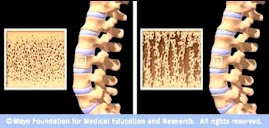"Vitamin B12 deficiency is estimated
to affect 10%-15% of people over the age of 60, and the laboratory diagnosis is
usually based on low serum vitamin B12 levels or elevated serum methylmalonic
acid and homocysteine levels. Although elderly people with low vitamin B12
status frequently lack the classical signs and symptoms of vitamin B12
deficiency, e.g. megaloblastic anemia, precise evaluation and treatment in this
population is important. Absorption of crystalline vitamin B12 does not decline
with advancing age. However, compared with the younger population, absorption
of protein-bound vitamin B12 is decreased in the elderly, owing to a high
prevalence of atrophic gastritis in this age group. Atrophic gastritis results
in a low acid-pepsin secretion by the gastric mucosa, which in turn results in
a reduced release of free vitamin B12 from food proteins. Furthermore,
hypochlorhydria in atrophic gastritis results in bacterial overgrowth of the
stomach and small intestine, and these bacteria may bind vitamin B12 for their
own use. The ability to absorb crystalline vitamin B12 remains intact in older
people with atrophic gastritis. The 1998 recommended daily allowance for
vitamin B12 is 2.4 micrograms, but elderly people should try to obtain their
vitamin B12 from either supplements or fortified foods (e.g. fortified
ready-to-eat breakfast cereals) to ensure adequate absorption from the gastrointestinal
tract. Because the American food supply is now being fortified with folic acid,
concern is increasing about neurologic exacerbation in individuals with
marginal vitamin B12 status and high-dose folate intake."
The recommended daily allowance (RDA) for B12 for adults of
all ages is still 2.4 micrograms (mcg) in 2015. My personal opinion is that the
RDA should be revised upward by a large amount.
When high doses of vitamin B12 are given orally, only a
small percentage can be absorbed, which may explain the low toxicity. Because
of the low toxicity of vitamin B12, no tolerable upper intake level (UL) has
been set by the US Food and Nutrition Board.
Because vitamin B12 malabsorption and vitamin B12 deficiency
are more common in older adults, the Linus Pauling Institute recommends that
adults older than 50 years take 100 to 400 mcg/day of supplemental vitamin B12.



No comments:
Post a Comment